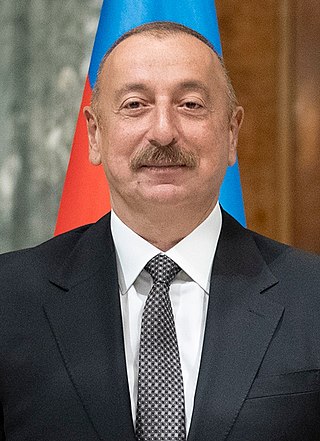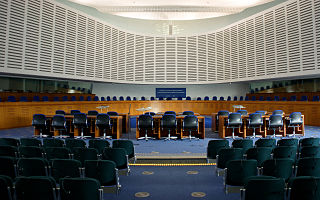
The European Convention on Human Rights is an international convention to protect human rights and political freedoms in Europe. Drafted in 1950 by the then newly formed Council of Europe, the convention entered into force on 3 September 1953. All Council of Europe member states are party to the Convention and new members are expected to ratify the convention at the earliest opportunity.

The European Court of Human Rights, also known as the Strasbourg Court, is an international court of the Council of Europe which interprets the European Convention on Human Rights. The court hears applications alleging that a contracting state has breached one or more of the human rights enumerated in the Convention or its optional protocols to which a member state is a party. The European Convention on Human Rights is also referred to by the initials "ECHR". The court is based in Strasbourg, France.

International organizations have frequently alleged that Azerbaijan has violated human rights standards established in international law.

Ilgar Mammadov is an opposition politician in Azerbaijan, and one of the leaders of the Republican Alternative Party. Mammadov was considered a likely candidate for the Presidential elections in October 2013, but was arrested in February 2013, prior to the race, in a move that was widely seen as politically motivated.
Article 3 of the European Convention on Human Rights prohibits torture, and "inhuman or degrading treatment or punishment".
Article 3 – Prohibition of torture
No one shall be subjected to torture or to inhuman or degrading treatment or punishment.
Novruzali Khanmammad oğlu Mammadov was an Azerbaijani philologist, journalist and activist of Talysh ethnicity. He was the founder and editor of the now-defunct newspaper Tolyshi Sado. Mammadov also worked at the Nasimi Institute of Linguistics of the Azerbaijan National Academy of Sciences and headed a Talysh cultural center, which was closed after his imprisonment.

Ilham Heydar oghlu Aliyev is the fourth president of Azerbaijan, serving in the post since 31 October 2003.
The European Union's (EU) Treaty of Lisbon, in force since 1 December 2009, requires the EU to accede to the European Convention on Human Rights (ECHR). Article 6 of the consolidated Treaty on European Union states "The Union shall accede to the European Convention for the Protection of Human Rights and Fundamental Freedoms. Such accession shall not affect the Union's competences as defined in the Treaties." The EU would thus be subject to its human rights law and external monitoring as its member states currently are. It is further proposed that the EU join as a member of the Council of Europe now that it has attained a single legal personality in the Lisbon Treaty.

Anar Mammadli is a prominent human rights activist in Azerbaijan. He is active in observing and monitoring elections, and he has repeatedly criticized the conduct of elections by Azerbaijani authorities. On 16 December 2013, Mammadli was arrested and jailed, following outspoken criticism of presidential elections in October 2013. In spite of international protests, Mammadli was sentenced to more than 5 years in jail in May 2014. On 29 September 2014, while still in detention, Mammadli was awarded the Václav Havel Human Rights Prize by the Parliamentary Assembly of the Council of Europe, which honours "outstanding" action in defence of human rights.

Gurban Mammadov is an Azerbaijani politician. He was born in the village of Jahri of Babek district of Nakhchivan Autonomous Republic. He received his education in Ordubad and later graduated from Azerbaijan State University, in Baku. After completing his studies, Mammadov worked as a lawyer for 35 years and played a significant role in Azerbaijani politics. He is known for his outspoken nature and willingness to speak out against the government.

Rauf Habibulla oghlu Mirgadirov is an Azerbaijani columnist and journalist. He has worked for the Baku based Russian-language newspaper Zerkalo. A believer in "citizen diplomacy" between Armenia and Azerbaijan over the Nagorno-Karabakh conflict, Mirgadirov was arrested for allegedly spying for Armenia and has been detained since April 2014. In December 2015, he was found guilty and sentenced to six years of prison. Following an appeal of his case, the ruling was upheld in March 2016, but Mirgadirov was released on suspended sentence.

Caviar diplomacy is a lobbying strategy of Azerbaijan, consisting of costly invitations to foreign politicians and employees of international organizations to Azerbaijan at the expense of the host country. Caviar diplomacy also includes expensive gifts presented as "a tribute to the Eastern tradition."
Janowiec and Others v. Russia was a case brought before the European Court of Human Rights in 2007 and concluded in 2013 concerning the issue of human right violations in the context of the Katyn massacre.
Russia was a member of the Council of Europe, an international organization that focuses on the promotion of democracy and human rights, from 1996 to 2022. At the time of its accession, Russia did not meet the requirements of membership, but it was believed that joining would help Russia improve its record on democracy and human rights protection. In a 2019 paper published in the International & Comparative Law Quarterly, international law scholars Kanstantsin Dzehtsiarou and Donal K Coffey described Russia as showing "persistent and clear disregard of the values and aims of the CoE", including occupying other member states, sponsoring separatist movements, and ignoring judgements of the European Court of Human Rights. In February 2022, 42 out of 47 member states voted for Russia to be suspended from membership in reaction to the 2022 Russian invasion of Ukraine. On 15 March, Russia formally announced its withdrawal from the organization, seeking to preempt a vote on expulsion; its membership was due to terminate on 31 December 2022. However, on 16 March the Committee of Ministers voted to expel Russia from the council with immediate effect. On January 17, 2023, Vladimir Putin submitted to the State Duma a draft law on the termination of international treaties of the Council of Europe with respect to Russia.
Fedotova and Others v. Russia was a case submitted by six Russian nationals to the European Court of Human Rights (ECtHR).
Bayev and Others v. Russia was a case brought to the European Court of Human Rights by three Russian activists—Nikolay Bayev, Aleksei Aleksandrovich Kiselev, and Nikolay Alekseyev—alleging that the Russian gay propaganda law infringed on their freedom of expression guaranteed by Article 10 of the European Convention on Human Rights. On 20 June 2017, the court ruled that the applicants' freedom of expression had been compromised. The only dissent was from Dmitry Dedov, the judge elected with respect to Russia.
Baka v. Hungary was a case of the European Court of Human Rights (ECtHR) heard by the second section of the court in 2014 and the Grand Chamber in 2016. Both the section and the Grand Chamber found that Hungary had violated the rights of András Baka, the former head of Hungary's supreme court who was dismissed after criticizing the government's judicial reforms.
Strasbourg Observers is an academic blog published in English, which focuses on recent developments relating to the European Court of Human Rights (ECtHR). The blog was established by Eva Brems together with her Ph.D. researchers from Ghent University, Belgium, in April 2010. Since 2021, the blog is maintained by researchers based at the Human Rights Centre of Ghent University and at the Centre for Government and Law of Hasselt University. Posts published in the blog have been cited several times in the separate opinions of the Court.

Saribekyan and Balyan v. Azerbaijan was an international human rights case filed by the parents of Manvel Saribekyan - an Armenian national from the TtuJur village in the Gegharkunik province of Armenia, who died while in captivity in Azerbaijan in 2010. The judgment of the European Court of Human Rights on the case originated in an application against the Republic of Azerbaijan lodged with the Court under the Convention for the Protection of Human Rights and Fundamental Freedoms on 10 June 2011.











